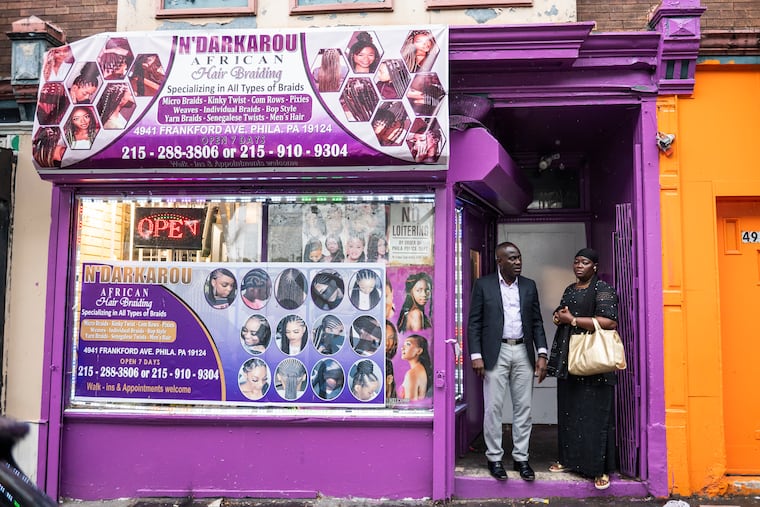Eliminating a state licensing requirement is a victory for Pa. hair braiders, micro-business owners, and Black immigrant women
What makes this victory especially meaningful and momentous is that it demonstrates that community organizing and building a community-centered collective voice are critical.

On Oct. 17, I was thrilled that I was finally able to write the following lines on my LinkedIn page: “The Coalition of African Communities (Africom) organized them and they won a historic battle in Pa.”
The post celebrated the fact that Gov. Josh Shapiro had just signed HB 1820 — now Act 100 of 2024 — eliminating the requirement of a “cosmetology” license for natural hair braiders in the state. This frees more than a thousand natural hair braiders — about 97% of them women, and most of them Black immigrants from West Africa — to run the hair braiding businesses that support their families here and abroad and to continue to contribute to the economic and cultural fabric of the state.
It means that these women can now open shops and operate their businesses without the obligation of getting and displaying a state-delivered “specialty license.” Obtaining such a license in Pennsylvania required hours of costly classes as well as passing a state-administered exam designed for cosmetologists who engage in chemical processing — not natural hair braiding. In the meantime, hundreds of natural hair braiders have received fines amounting to $500 per ticket for noncompliance; others have been ordered to cease-and-desist operations.
When my colleagues and I at Africom and our partners took on the campaign to repeal the class requirements for licensing in 2018, the goal was to build the campaign with the affected hair braiders. Focus group discussions and one-on-one conversations with them took place in shops on Fifth Street and Olney Avenue, Frankford, Ogontz Avenue, and Rising Sun Avenue business corridors, just to name a few sites. A WhatsApp group named after the campaign’s theme, “Support Hair braiding Freedom in Pennsylvania,” was created to share information and updates and hear directly from the affected braiders. Information was shared in English, French, and multiple African languages.
The focus initially was on immigrant justice, but soon it became evident that — in addition to promoting equity for those who’ve recently arrived in the commonwealth — worker rights were at stake.
Seeing the “Support Hair braiding Freedom in Pennsylvania” campaign as a worker rights campaign broadened its scope and rallied more supporters and stakeholders across ethnic, social, and professional groups. Organizations like the Pennsylvania Immigration Coalition (PIC) and Southwest CDC in Southwest Philadelphia joined in the fight, helping to secure legislative visits with lawmakers across Philadelphia and Delaware County. During hearings and advocacy visits to lawmakers, the hair braiders shared compelling stories that underscored the inherent unfairness of the regulations that were in place.
What makes this victory especially meaningful is that it demonstrates that organizing and building a community-centered collective voice is critical for members of our community, especially African and Caribbean immigrants, who have a history of being civically disengaged in Philadelphia.
When Lee McGrath of the Institute for Justice — the nonprofit public interest law firm that assisted Africom in this campaign — called me the morning the bill was signed to let me know about it, I immediately shared the news with the more than 150 natural hair braiders who are part of our WhatsApp group.
The members of the group replied with words of thanks, blessings, and prayers for each other, their female leaders, and the people and organizations that partnered with them in the fight: McGrath, Nadia Hewka of the Community Legal Services, and John Shaw of Shaw Keller Law Offices.
When workers, men and women, and immigrants organize and advocate for their rights, they win. And coming about four weeks before the 2024 general election, the news sent a message to immigrant working families and communities, reminding them that they belong, and their voices definitely matter.
Now that Act 100 of 2024 is in the books, it is time to start watching for its effective implementation throughout Pennsylvania. The struggle continues.
Eric Edi is the COO of Africom in Philadelphia and a senior program officer at the Solidarity Center in Washington, D.C.